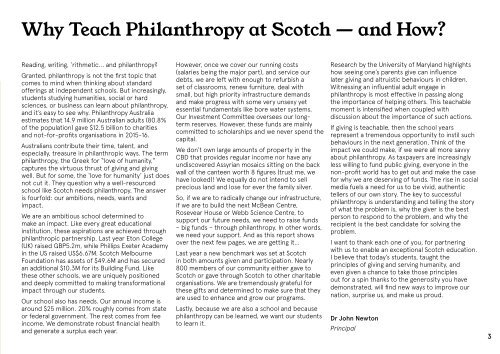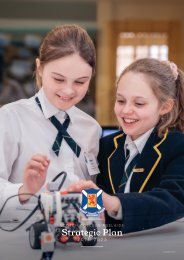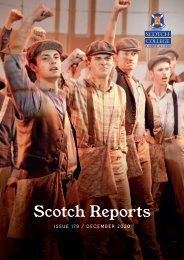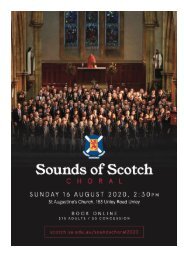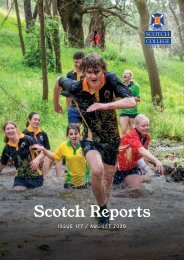Scotch College Philanthropy Impact Report 2017
Create successful ePaper yourself
Turn your PDF publications into a flip-book with our unique Google optimized e-Paper software.
Why Teach <strong>Philanthropy</strong> at <strong>Scotch</strong> — and How?<br />
Reading, writing, ‘rithmetic... and philanthropy?<br />
Granted, philanthropy is not the first topic that<br />
comes to mind when thinking about standard<br />
offerings at independent schools. But increasingly,<br />
students studying humanities, social or hard<br />
sciences, or business can learn about philanthropy,<br />
and it’s easy to see why. <strong>Philanthropy</strong> Australia<br />
estimates that 14.9 million Australian adults (80.8%<br />
of the population) gave $12.5 billion to charities<br />
and not-for-profits organisations in 2015-16.<br />
Australians contribute their time, talent, and<br />
especially, treasure in philanthropic ways. The term<br />
philanthropy, the Greek for “love of humanity,”<br />
captures the virtuous thrust of giving and giving<br />
well. But for some, the ‘love for humanity’ just does<br />
not cut it. They question why a well-resourced<br />
school like <strong>Scotch</strong> needs philanthropy. The answer<br />
is fourfold: our ambitions, needs, wants and<br />
impact.<br />
We are an ambitious school determined to<br />
make an impact. Like every great educational<br />
institution, these aspirations are achieved through<br />
philanthropic partnership. Last year Eton <strong>College</strong><br />
(UK) raised GBP5.2m, while Phillips Exeter Academy<br />
in the US raised US$6.67M. <strong>Scotch</strong> Melbourne<br />
Foundation has assets of $49.6M and has secured<br />
an additional $10.3M for its Building Fund. Like<br />
these other schools, we are uniquely positioned<br />
and deeply committed to making transformational<br />
impact through our students.<br />
Our school also has needs. Our annual income is<br />
around $25 million. 20% roughly comes from state<br />
or federal government. The rest comes from fee<br />
income. We demonstrate robust financial health<br />
and generate a surplus each year.<br />
However, once we cover our running costs<br />
(salaries being the major part), and service our<br />
debts, we are left with enough to refurbish a<br />
set of classrooms, renew furniture, deal with<br />
small, but high priority infrastructure demands<br />
and make progress with some very unsexy yet<br />
essential fundamentals like bore water systems.<br />
Our Investment Committee oversees our longterm<br />
reserves. However, these funds are mainly<br />
committed to scholarships and we never spend the<br />
capital.<br />
We don’t own large amounts of property in the<br />
CBD that provides regular income nor have any<br />
undiscovered Assyrian mosaics sitting on the back<br />
wall of the canteen worth 8 figures (trust me, we<br />
have looked)! We equally do not intend to sell<br />
precious land and lose for ever the family silver.<br />
So, if we are to radically change our infrastructure,<br />
if we are to build the next McBean Centre,<br />
Rosevear House or Webb Science Centre, to<br />
support our future needs, we need to raise funds<br />
– big funds – through philanthropy. In other words,<br />
we need your support. And as this report shows<br />
over the next few pages, we are getting it…<br />
Last year a new benchmark was set at <strong>Scotch</strong><br />
in both amounts given and participation. Nearly<br />
800 members of our community either gave to<br />
<strong>Scotch</strong> or gave through <strong>Scotch</strong> to other charitable<br />
organisations. We are tremendously grateful for<br />
these gifts and determined to make sure that they<br />
are used to enhance and grow our programs.<br />
Lastly, because we are also a school and because<br />
philanthropy can be learned, we want our students<br />
to learn it.<br />
Research by the University of Maryland highlights<br />
how seeing one’s parents give can influence<br />
later giving and altruistic behaviours in children.<br />
Witnessing an influential adult engage in<br />
philanthropy is most effective in passing along<br />
the importance of helping others. This teachable<br />
moment is intensified when coupled with<br />
discussion about the importance of such actions.<br />
If giving is teachable, then the school years<br />
represent a tremendous opportunity to instil such<br />
behaviours in the next generation. Think of the<br />
impact we could make, if we were all more savvy<br />
about philanthropy. As taxpayers are increasingly<br />
less willing to fund public giving, everyone in the<br />
non-profit world has to get out and make the case<br />
for why we are deserving of funds. The rise in social<br />
media fuels a need for us to be vivid, authentic<br />
tellers of our own story. The key to successful<br />
philanthropy is understanding and telling the story<br />
of what the problem is, why the giver is the best<br />
person to respond to the problem, and why the<br />
recipient is the best candidate for solving the<br />
problem.<br />
I want to thank each one of you, for partnering<br />
with us to enable an exceptional <strong>Scotch</strong> education.<br />
I believe that today’s students, taught the<br />
principles of giving and serving humanity, and<br />
even given a chance to take those principles<br />
out for a spin thanks to the generosity you have<br />
demonstrated, will find new ways to improve our<br />
nation, surprise us, and make us proud.<br />
Dr John Newton<br />
Principal<br />
3


